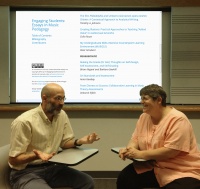 At the end of August, music theory professors Timothy Johnson and Deborah Rifkin each published an essay in an electronic book titled Engaging Students: Essays in Music Pedagogy.
At the end of August, music theory professors Timothy Johnson and Deborah Rifkin each published an essay in an electronic book titled Engaging Students: Essays in Music Pedagogy. At the end of August, music theory professors Timothy Johnson and Deborah Rifkin each published an essay in an electronic book titled Engaging Students: Essays in Music Pedagogy.
At the end of August, music theory professors Timothy Johnson and Deborah Rifkin each published an essay in an electronic book titled Engaging Students: Essays in Music Pedagogy.
Engaging Students is a free, open-access, web-based resource for college level music theory educators. The e-book contains writings from both a philosophical and practical nature on a wide range of topics, including assessment, learning outcomes, in-class and out-of-class activities, and technology.
Johnson and Rifkin’s inclusion in this publication is one of many efforts to push the Ithaca College music theory program to the forefront of innovation at the national level in music theory teaching.
A professor of music theory, Johnson published The film Philadelphia and Umberto Giordano’s opera Andrea Chénier: A Contextual Approach to Analytical Writing. His essay describes and provides an interdisciplinary paper assignment that combines advanced music analysis with film study and a close reading of the libretto in an opera scene that appears prominently in the film Philadelphia (starting Tom Hanks).
He has used this assignment in Form and Analysis classes over the past three years at Ithaca College, and now the assignment itself, in addition to the essay, is available to the entire profession via this publication. Students from around the world may soon be writing papers about this film scene based on Dr. Johnson’s innovative and effective assignment.
Josh Zimmer (’13), Johnson’s former student who earned a B.M. in Music Education, said that the assignment helped bring, “the initially vague context of the aria to life. Students are essentially limitless in exploring their own curiosities in so far as musical concepts in relation to the aria, the aria to the film scene, as well as a large variety of possible connections to be made.”
An associate professor of music theory, Rifkin published From Distress to Success: Collaborative Learning in Music Theory Assessments. Her essay presents a creative way to restructure traditional music assessments such that they minimize test anxiety and maximize the advantages of peer interaction and evaluation; she has been employing this approach successfully at the Ithaca College School of Music.
In this publication she seeks to alter the format of music assessment to involve students in multiple roles (performer, listener, evaluator, problem-solver). The essay shares her well-researched and classroom-tested approach with the community of music teachers.
Student response to the approach has been strong. In anonymous student feedback gathered, a student remarked, “One thing that stuck out with the practicums is that I retained the material much more than I would with material for hearings.”
Another responded, “I could sit in a practice room for three hours and memorize everything, … but it does not have the same effect. I learn more by my mistakes in a comfortable learning environment with my peers.”
Rifkin’s methodology has the potential to be adopted by instructors at colleges and universities nationally and internationally. Students benefitting from her new approach will have less stressful and more educationally beneficial evaluative experiences.
The editorial committee of Engaging Students (which includes Rifkin) envisioned a new format for scholarly communication based upon collaborative and swift peer review. Authors received feedback on their manuscripts within a week or two of submission from peer reviewers. The revision process consisted of online interactions between authors and the editorial group, a process lasting less than a month from submission to publication. The resulting e-book is an informative and well-written product and is the result of an efficient and groundbreaking process.
https://www.ithaca.edu/intercom/article.php/20130918120512710